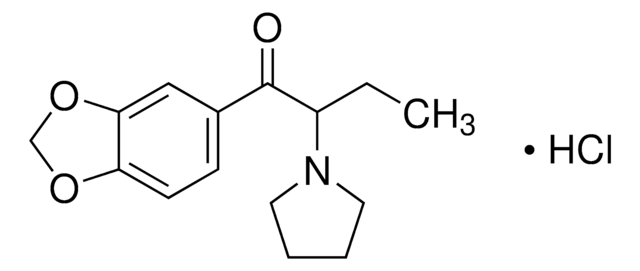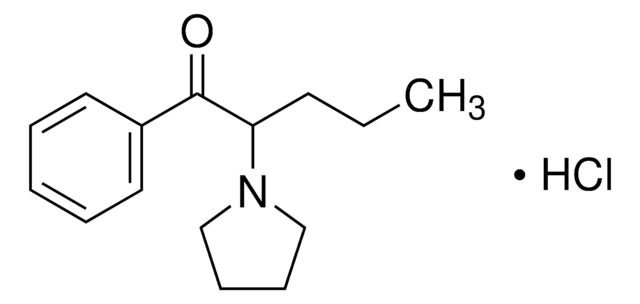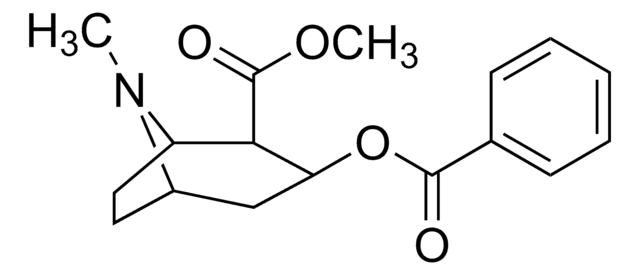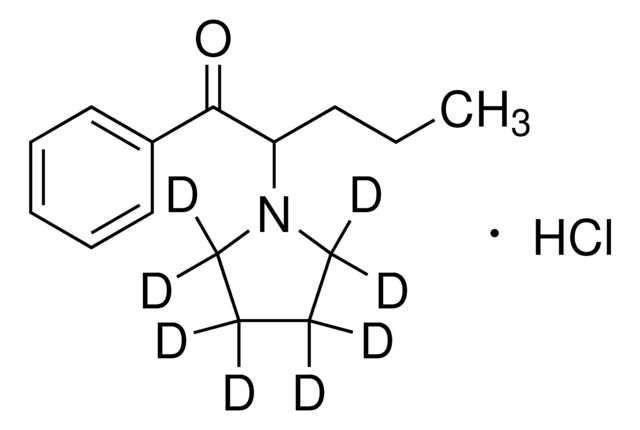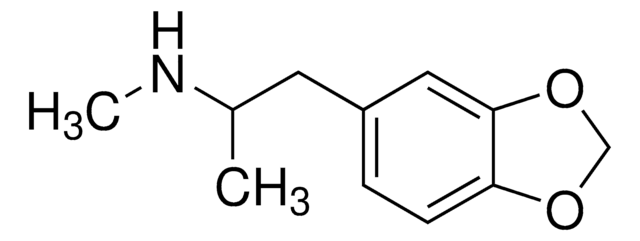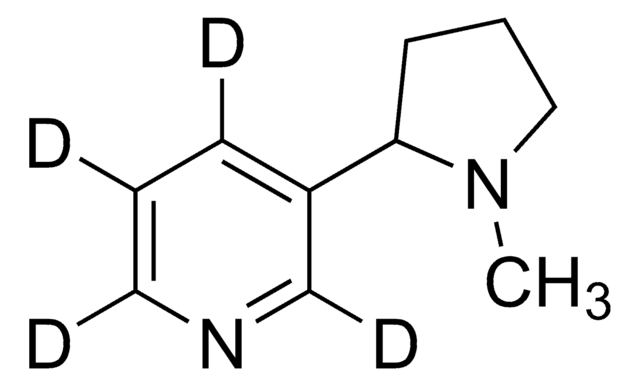M-146
3,4-Methylenedioxypyrovalerone HCl (MDPV) solution
1.0 mg/mL in methanol (as free base), ampule of 1 mL, certified reference material, Cerilliant®
Synonym(s):
3,4-Methylenedioxypyrovalerone hydrochloride, MDPV hydrochloride, MDPV
About This Item
Recommended Products
grade
certified reference material
Quality Level
form
liquid
feature
Snap-N-Spike®/Snap-N-Shoot®
packaging
ampule of 1 mL
manufacturer/tradename
Cerilliant®
drug control
Narcotic Licence Schedule E (Switzerland); psicótropo (Spain); Decreto Lei 15/93: Tabela IIA (Portugal)
concentration
1.0 mg/mL in methanol (as free base)
technique(s)
gas chromatography (GC): suitable
liquid chromatography (LC): suitable
application(s)
forensics and toxicology
format
single component solution
storage temp.
−20°C
SMILES string
Cl.N3(CCCC3)C(CCC)C(=O)c1cc2c(cc1)OCO2
InChI
1S/C16H21NO3.ClH/c1-2-5-13(17-8-3-4-9-17)16(18)12-6-7-14-15(10-12)20-11-19-14;/h6-7,10,13H,2-5,8-9,11H2,1H3;1H
InChI key
PYQZNWFQAMFAMT-UHFFFAOYSA-N
General description
Legal Information
related product
Signal Word
Danger
Hazard Statements
Precautionary Statements
Hazard Classifications
Acute Tox. 3 Dermal - Acute Tox. 3 Inhalation - Acute Tox. 3 Oral - Flam. Liq. 2 - STOT SE 1
Target Organs
Eyes,Central nervous system
Storage Class Code
3 - Flammable liquids
WGK
WGK 2
Flash Point(F)
49.5 °F - closed cup
Flash Point(C)
9.7 °C - closed cup
Choose from one of the most recent versions:
Certificates of Analysis (COA)
It looks like we've run into a problem, but you can still download Certificates of Analysis from our Documents section.
If you need assistance, please contact Customer Support.
Already Own This Product?
Find documentation for the products that you have recently purchased in the Document Library.
Articles
The combination of ion-exchange SPE with the HILIC HPLC separation provides a novel approach for the testing of problematic bath salt compounds.
This article highlights the impact that sample matrix effects can have on LC/MS response and discusses two novel approaches to reduce it.
LC-MS/MS is a powerful tool that brings numerous benefits to the clinical sample analysis arena. However, due to the complexity of the instrumentation there are some unique challenges that also accompany these benefits. Even following sample extraction and cleanup, matrix effects from the samples can cause interferences or impact ionization efficiency.
Protocols
Separation of 3,4-Methylenedioxypyrovalerone HCl (MDPV) solution, 1.0 mg/mL in methanol (as free base), ampule of 1 mL, certified reference material; Buphedrone hydrochloride solution, 1.0 mg/mL in methanol (as free base), ampule of 1 mL, certified reference material; 3-Fluoromethcathinone hydrochloride solution, 1.0 mg/mL in methanol (as free base), ampule of 1 mL, certified reference material; Butylone hydrochloride solution, 1.0 mg/mL in methanol (as free base), ampule of 1 mL, certified reference material; Ethylone hydrochloride, 1.0 mg/mL in methanol (as free base), ampule of 1 mL, certified reference material; 4-Fluoromethcathinone hydrochloride solution, 1.0 mg/mL in methanol (as free base), ampule of 1 mL, certified reference material; Mephedrone hydrochloride solution, 1.0 mg/mL in methanol (as free base), ampule of 1 mL, certified reference material; Methylone hydrochloride, 1.0 mg/mL in methanol (as free base), ampule of 1 mL, certified reference material; Methedrone hydrochloride solution, 1.0 mg/mL in methanol (as free base), ampule of 1 mL, certified reference material
Our team of scientists has experience in all areas of research including Life Science, Material Science, Chemical Synthesis, Chromatography, Analytical and many others.
Contact Technical Service